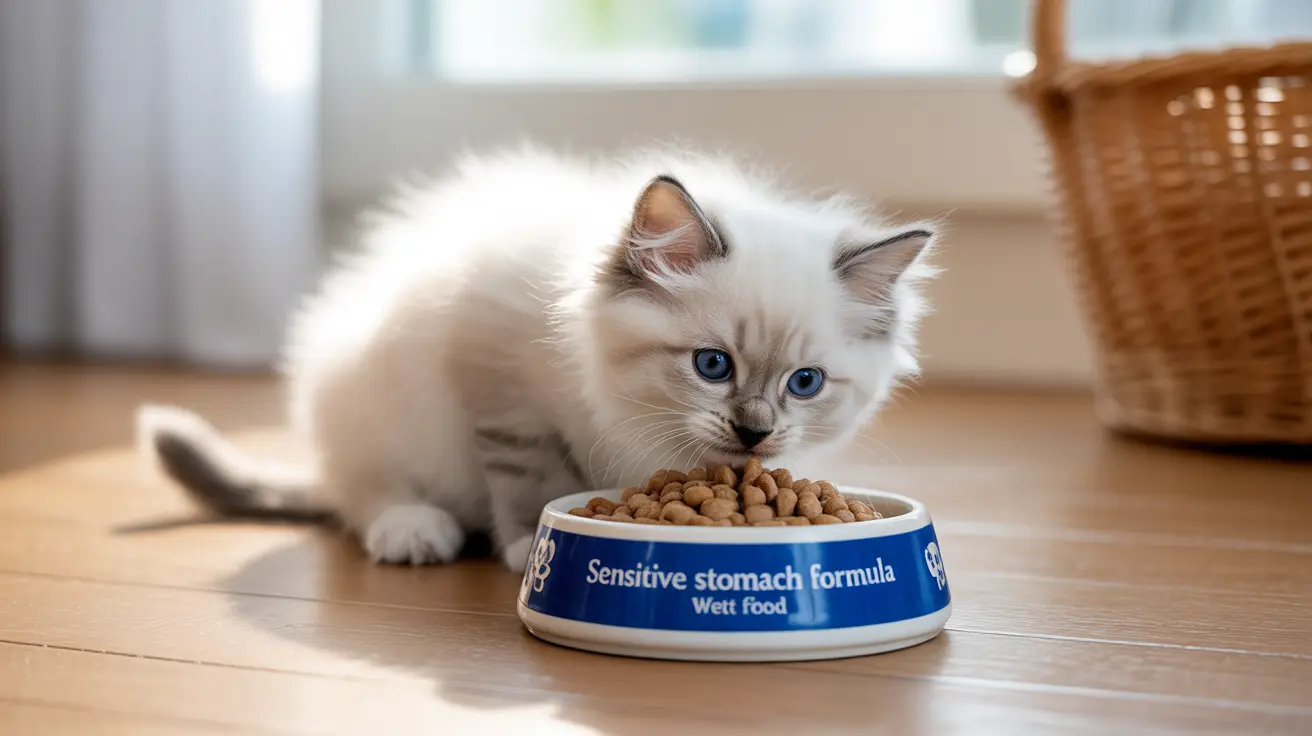Understanding Sensitive Stomachs in Kittens
Kittens with sensitive stomachs often show signs like vomiting, diarrhea, or decreased appetite. These symptoms can stem from various causes, including food intolerances, allergies, or an immature digestive system. Understanding these underlying factors is crucial for selecting the right food.
Most kittens develop a more robust digestive system as they age, but proper nutrition during their growth phase is essential for healthy development. Sensitive stomach issues in kittens shouldn't be ignored, as they can impact growth and overall well-being.
Key Nutritional Requirements for Sensitive Kittens
Kittens with sensitive stomachs need carefully balanced nutrition that's gentle on their digestive system while supporting healthy growth. Look for foods that contain:
- High-quality, easily digestible proteins (40% or higher)
- Moderate healthy fats (9% minimum)
- Limited carbohydrates
- Essential nutrients like DHA for brain development
- Prebiotics for digestive health
- Vitamins E and C for immune support
Choosing the Right Formula
When selecting kitten food for sensitive stomachs, consider these important factors:
Limited Ingredient Diets
Limited ingredient diets (LIDs) can help identify and avoid trigger foods. These formulas typically feature:
- Single protein source
- Minimal ingredients
- No artificial preservatives or flavors
- Easily digestible components
Wet vs. Dry Food Options
Both wet and dry foods can work for sensitive stomachs, but wet food often provides advantages:
- Higher moisture content
- Easier digestibility
- Better hydration
- Softer texture for young kittens
Top Recommended Brands and Formulas
Several high-quality brands offer specialized formulas for sensitive kittens:
- Hill's Science Diet Sensitive Stomach & Skin Kitten Formula
- Royal Canin Gastrointestinal Kitten
- KOHA Limited Ingredient Diet
- Blue Buffalo Sensitive Stomach Kitten Formula
- Purina Pro Plan Focus Sensitive Skin & Stomach
Transitioning and Feeding Guidelines
Proper food transition is crucial for kittens with sensitive stomachs. Follow these steps:
- Start with 75% old food, 25% new food
- Gradually increase new food proportion over 7-10 days
- Monitor stool consistency and overall health
- Adjust transition speed based on your kitten's response
Frequently Asked Questions
What are the best kitten foods formulated specifically for sensitive stomachs?
The best options include Hill's Science Diet Sensitive Stomach & Skin Kitten Formula, Royal Canin Gastrointestinal Kitten, and KOHA Limited Ingredient Diet. These formulas contain easily digestible proteins and specialized ingredients for sensitive digestion.
How do I gradually transition my sensitive-stomach kitten to a new food without causing digestive upset?
Transition over 7-10 days, starting with 25% new food mixed with 75% current food. Gradually increase the new food proportion while monitoring your kitten's reaction. If you notice any digestive issues, slow down the transition process.
Which ingredients should I look for or avoid when choosing kitten food for sensitive digestion?
Look for high-quality proteins, prebiotics, and digestive enzymes. Avoid common allergens like corn, wheat, soy, and artificial preservatives. Single-source protein formulas are often best for sensitive stomachs.
Can limited ingredient diets help kittens with food allergies and sensitive stomachs?
Yes, limited ingredient diets can be very effective for kittens with food sensitivities. These formulas make it easier to identify problem ingredients and provide easily digestible nutrition with fewer potential allergens.
What are common signs of a sensitive stomach in kittens that warrant veterinary advice?
Seek veterinary care if you notice persistent vomiting, diarrhea, significant weight loss, lethargy, or loss of appetite. These symptoms could indicate serious underlying conditions that require professional attention.
Conclusion
Finding the right kitten food for sensitive stomachs may take some trial and error, but with patience and careful observation, you can help your kitten thrive. Remember to always consult with your veterinarian before making significant dietary changes, and monitor your kitten's response to new foods closely.
By following these guidelines and choosing high-quality, specially formulated foods, you can help your sensitive kitten develop a healthy digestive system while getting all the nutrients needed for proper growth and development.






